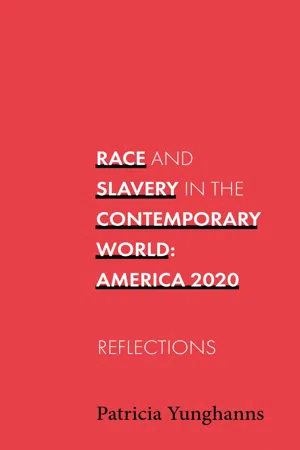
- English
- ePUB (mobile friendly)
- Available on iOS & Android
About This Book
Race and Slavery in the Contemporary World begins with a message the author wrote to five prominent Black public figures. In the message, the author brought out several facts she had observed, including the way the government was not obeying its laws. Another major observation was how AmendmentIX of the Bill of Rights was being broken.
The Constitutional Laws of the US are intended to limit government power and put constraints on it, just as legislative laws are meant to constrain the citizens. This structure creates the rule of law that is essential to enjoying freedoms.
The first part of the work is devoted to reflections on the value of a Black woman and is followed by reflections on why the Blacks were freed from slavery. Among the topics and issues examined are the definition of equality in America, changes in ownership of slaves, the impact of voting, and punishment for disobedience.
"These reflections are a part of voicing my grievances or complaints... My reflections might seem quite legal and historical. That is because I have found that at the root of the problems that I mention, including my own, is a law at the mercy of uncontrolled political thinking".
"Race And Slavery In The Contemporary World" is an intensely thought-provoking work. The reader will find themselves asking the questions it raises, such as "Why have we[Blacks] failed to negotiate our freedoms?" The book explores insightful topics such as the philosopher Rousseau's description of the slavery paradox and enforcement of punishment.
The more near to home topics such as harassment and impact on Black women are also well covered.
Race and Slavery in the Contemporary World contains such topics concerning the French philosopher Jean-Jacques Rousseau, suchas Jean-Jacques Rousseau;
Rousseau's Description of the Slavery Paradox; Definition of Slavery on Rousseau's Views; Analogy of Rousseau's Idea: An Agreement; The Social Contract: Rousseau's Solution and Active Agreement, Rousseau's Ideas as Practiced in the Contemporary World: People Participation, and
Rousseau Requirement of Legitimacy for Slavery. It also looks at the philosopher of political science, Alexis de Tocqueville. In addition, it looks at the American Promise as regards to a topic, such as The American Way: The most surprising Historical Change. It considers historically reported events up to our present moment.
Frequently asked questions
Information
| AMENDMENT IX The enumeration in the Constitution, of certain rights, shall not be construed to deny or disparage others retained by the people. United States of America 1789 (rev. 1992) |
Table of contents
- PREFACE
- Part I
- Reflections on the Value of a Black Woman
- Part II
- Reflections on When Blacks were Freed from Slavery
- CONCLUSION
- A SUMMARY
- GLOSSARY
- BILL OF RIGHTS
- About the Author